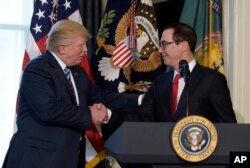U.S. President Donald Trump has ordered a full review of the powers given to government regulators to oversee the banking and finance industries following the financial meltdown of 2008.
Trump went to the Treasury Department on Friday to sign three executive orders that start the process of fulfilling his campaign pledges to undo regulations that he says unduly strain the U.S. economy.
"My entire administration [is] working around the clock to help struggling Americans achieve their financial dreams ... and have real confidence in the future," Trump said as he signed the orders. "Together we will restore prosperity to this nation."
U.S. Treasury Secretary Steve Mnuchin explained that two of the orders could eventually lead to a significant revision of controversial provisions of the 2010 Dodd-Frank Wall Street Reform law.
"Our goal is to make this a smarter, more effective process that reduces the kind of systemic risk that harmed so many Americans during the financial crisis of 2008," Mnuchin said.
Dodd-Frank reform
One order temporarily freezes a portion of Dodd-Frank known as the Orderly Liquidation Authority, which gives the federal government broad discretion in making loans to failing financial institutions. The Trump administration argues that the OLA encourages excessive risk-taking by banks because taxpayers are potentially liable for bad loans.
Trump on Friday called the Dodd-Frank regulations "unfair" and "damaging," saying they had "failed to hold Wall Street firms accountable."
Critics say the review is aimed at revoking Obama-era reforms that have brought stability and transparency to the sometimes murky world of high finance, and helped to prevent another crisis.
Edwin Truman, who served as a senior Treasury official in the Clinton and Obama administrations, says Dodd-Frank encourages banks to raise more capital and be more open about their activities.
"That doesn’t mean that a complicated piece of legislation like Dodd-Frank couldn’t be improved and tweaked," Truman told VOA. "It’s like Obamacare. It could be improved while maintaining its basic principles. So there’s scope for reform but not really repeal or replacement."
Boston University law professor Tamar Frankel, an expert in financial system regulation, said Dodd-Frank has not achieved the purpose for which it was designed, which is to create consumer confidence in the banking industry. But she worries that a rollback of Obama-era regulations could bring about a return to dangerous lending practices.
"Loans of the kind banks made before 2008 are the poison of any financial system," Frankel said.
Tax laws
Trump’s latest orders also authorize a review of tax laws, which the president argues impose an undue burden on taxpayers.
"This is such a privilege for me to sign," he said during the ceremony. "This is really the beginning of a whole new way of life that this country hasn’t seen in really many, many years."
Secretary Mnuchin told reporters Friday he was looking forward to taking a hard look at the tax code.
"We are going to go through and look at every significant financial regulation that’s been done in the past year and a half," Mnuchin explained. "We’re going to determine if they’re needed in the tax code, or if they’re unnecessary."
In making his case, Mnuchin pointed to statistics showing individuals and businesses cumulatively spend a total of 6.1 billion hours complying with the tax code each year, at a cost to the U.S. economy of $234.4 billion. He said the basic Form 1040 used to file taxes had grown from 34 lines and two pages of instructions to 79 lines and 211 pages of instructions.
Mnuchin has 180 days to report back to the president with recommended reforms.
Trump also hinted Friday that he’s almost ready to make another big announcement on taxes, saying he was ready to unveil a "massive tax cut" next week, shortly before he reaches the symbolic 100-day mark of his presidency.
"The process has begun long ago, " he said, "but it really formally begins on Wednesday."
In a separate interview with The Associated Press, Trump said the plan would provide tax cuts for both individuals and businesses. He would not provide details of the plan, saying only that the tax cuts will be "bigger I believe than any tax cut ever."





